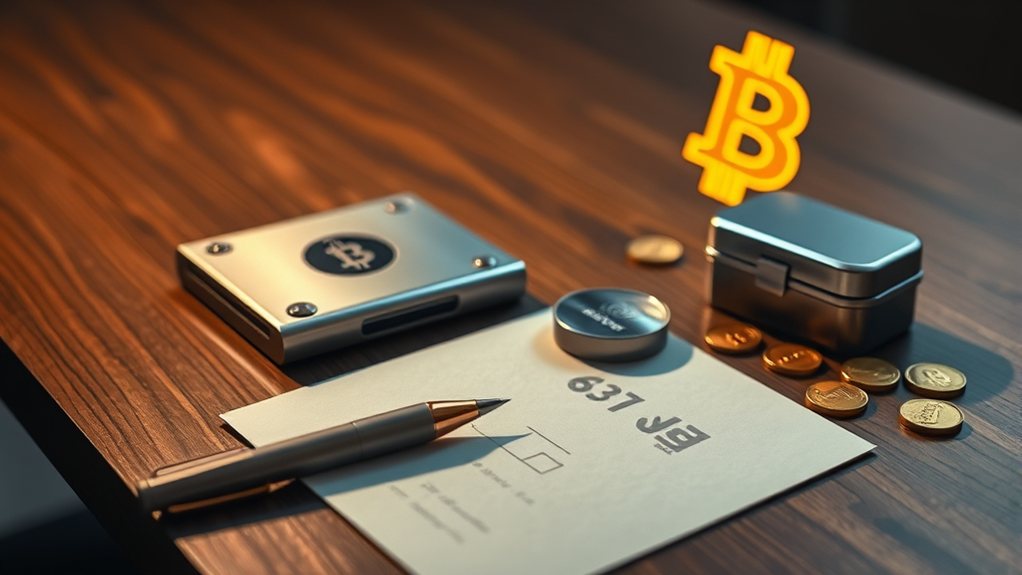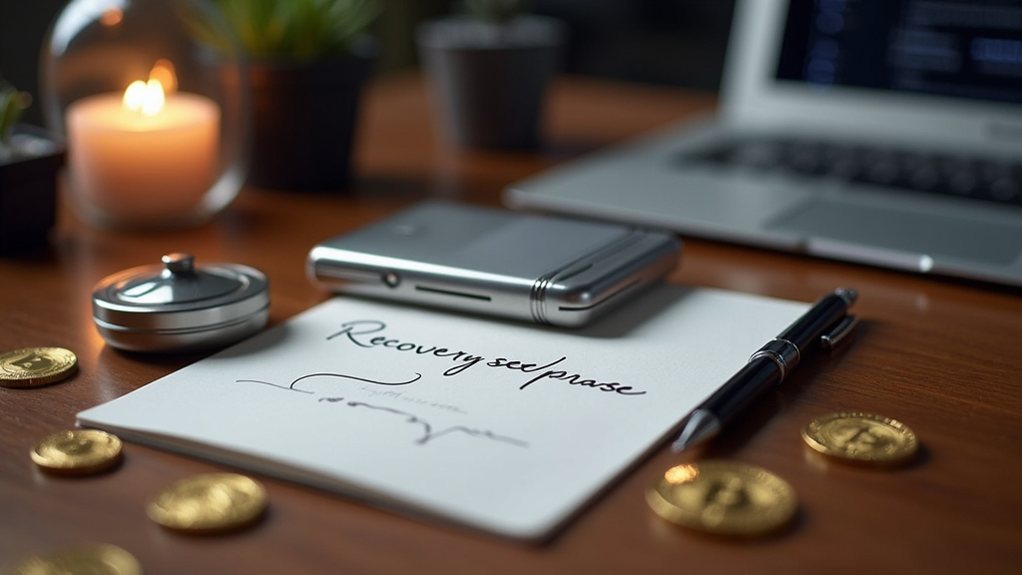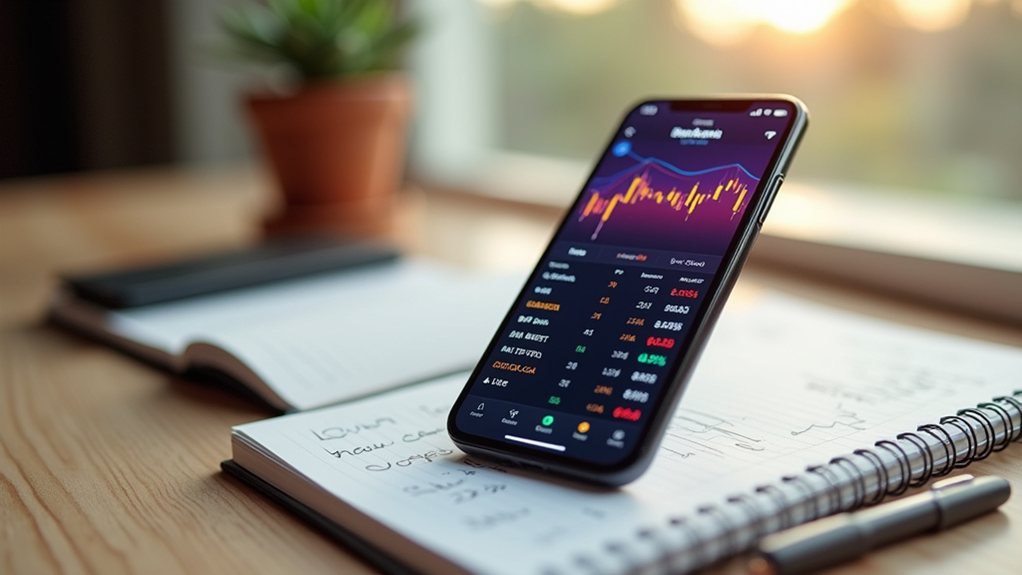Storing Bitcoin safely involves choosing the right wallet type first. Hardware wallets offer maximum security for long-term storage; software wallets work for regular transactions. After selecting, download from official sites only and generate a recovery seed phrase—write it down on paper, never digitally. Store this phrase in waterproof, fireproof containers or on metal plates. Always make test transactions before large transfers. The world of crypto security gets deeper than most newcomers expect.

Security matters. In the wild west of cryptocurrency, your Bitcoin is only as safe as the wallet protecting it. People lose fortunes through carelessness. A hardware wallet offers the highest level of security for those serious about long-term storage, while software wallets work better for regular transactions. Mobile options keep Bitcoin accessible on smartphones. Paper wallets? Free but finicky. Multi-signature wallets demand multiple keys—extra hoops, extra protection. Popular wallet options like Kraken Pro and Coinbase provide different features to meet various security needs.
Setting up a wallet isn't rocket science. Users download wallet software from official websites—never random links. The wallet generates a recovery seed phrase that's fundamentally the keys to the kingdom. Write this down. On paper. With a pen. Not a screenshot, not an email to yourself. Some folks think they're clever storing seeds digitally. They're not. Strong passwords and two-factor authentication add necessary layers when available. Remember that wallets use public key cryptography to secure your Bitcoin transactions on the blockchain.
Setting up a wallet requires seriousness, not shortcuts. Your recovery seed isn't just important—it's everything. Digital storage is foolishness disguised as convenience.
The recovery seed requires paranoia-level protection. Fireproof and waterproof storage containers aren't overkill—they're baseline precautions. Smart Bitcoin owners split their seed phrases into multiple parts stored in different locations. Memorizing the phrase serves as an additional backup. Testing the recovery process before it's needed? Non-negotiable. Using metal plates for storing seed phrases provides durable materials that resist environmental damage.
Moving Bitcoin into the wallet requires attention to detail. One wrong character in a receiving address, and those coins vanish forever. No customer service hotline to call. Starting with a small test transaction before transferring large amounts saves heartache. Blockchain confirmations matter—patience prevents panic.
Cold storage isn't just for popsicles. Large Bitcoin holdings belong in offline storage. Hardware wallets excel here. Hot wallets—connected to the internet—should only hold amounts needed for near-term transactions. Institutional players often implement multi-signature setups requiring multiple approvals for transfers. Regular security audits aren't optional.
Bitcoin safety demands vigilance. Private keys and seed phrases are never shared—period. Dedicated devices for cryptocurrency transactions reduce risks dramatically. Software updates aren't just annoying pop-ups; they're security patches. Phishing attempts grow increasingly sophisticated. The password reused across seventeen websites? Recipe for disaster.
Backup plans separate the responsible from the reckless. Redundant backups in multiple locations create safety nets. Safety deposit boxes offer additional security. Trusted family members should know how to access funds in emergencies—without knowing the actual keys. Clear documentation helps heirs avoid locked-away fortunes if the unthinkable happens.
Storage methods require periodic review as technology and threats evolve. Bitcoin's promise of financial sovereignty comes with responsibility. No safety nets. No chargebacks. Just you, your keys, and your precautions.
Frequently Asked Questions
What Happens to My Bitcoins if I Lose My Wallet Password?
Losing a Bitcoin wallet password is a disaster.
Bitcoins remain visible on the blockchain but completely inaccessible. Forever. No bank to call, no reset button to push.
Around 20% of all bitcoins are already lost this way, worth about $140 billion in 2021.
Recovery options exist if there's a backup phrase. Without it? Those digital coins might as well be on Mars.
Can I Store Bitcoins on Multiple Wallets Simultaneously?
Yes, users can store bitcoin on multiple wallets simultaneously.
Bitcoin isn't physically "in" wallets—it exists on the blockchain. Wallets just hold the keys to access it.
Many owners split funds across hardware wallets for large holdings, mobile wallets for daily spending, and paper wallets for cold storage.
Smart strategy, really. Different security levels for different purposes.
Hardware wallets for the serious stash, phone apps for coffee money.
How Often Should I Update My Wallet Software?
Wallet software should be updated monthly at minimum.
Critical security patches? Update immediately. No excuses.
Outdated wallets leave funds vulnerable to hackers and exploits—simple as that. They also lose compatibility with network upgrades.
Smart users enable automatic updates when available.
Before any major update, backing up private keys is non-negotiable.
The crypto world evolves constantly; wallet software must keep pace.
Are Bitcoin Transactions Reversible if I Make a Mistake?
Bitcoin transactions aren't reversible. Period. Once confirmed on the blockchain, that money's gone.
No customer service to call, no manager to complain to. Tough luck.
For unconfirmed transactions, there's a sliver of hope with Replace-by-Fee, but the window's tiny—minutes, not hours.
Even then, success isn't guaranteed.
This immutability? It's not a bug, it's a feature. The whole point of cryptocurrency.
Decentralized means no take-backs.
What Tax Implications Should I Consider When Storing Bitcoins?
Tax implications for Bitcoin storage aren't about where coins are kept.
It's about transactions. Transfers between personal wallets? Not taxable. Selling or trading? Definitely taxable. The IRS views Bitcoin as property, not currency. Ridiculous, right?
Long-term holders (over a year) get lower tax rates. Record-keeping is essential—the IRS isn't exactly forgiving when it comes to crypto.
Different storage methods don't trigger taxes; buying, selling and trading do.








